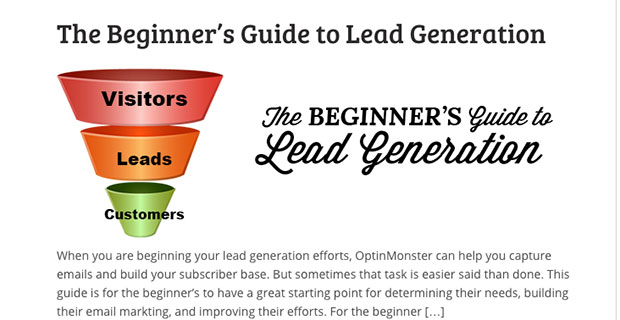

Are you running out of blog post ideas? Not sure what type of blog posts you should write? Don’t worry. In this article, we will cover 73 different types of blog posts that are proven to work, so you will never run out of blog post ideas again.
1. Tutorials and How-to Guides
Tutorials and How-to guides are probably the simplest type of blog post you can work on. They are easy because they involve you talking about things you are already familiar with such as your product or service.
The most important thing when it comes to how-to guides is to break down your tutorial into the smallest steps and into the simplest terms. Don’t assume your readers know what they’re doing — this is a tutorial, remember?
Think about your recent work, and you can probably find some great ideas for you to write a tutorial on. Our co-founder built the largest WordPress resource, WPBeginner, by following this exact same principle.
2. Latest Industry News
You have your morning routine, just like I do. You skim the online news and find the latest trends in your industry. Why not make your morning routine into a blog post?

Find a few of the most recent events in your industry and blog about them. You can even link to news articles if you feel it is appropriate.
The important thing is that you add your “flavor” to it (thoughts, criticism, etc). You will have a new blog post in minutes!
3. Current Events
Similar to the point above, this one is even more generic. What do you enjoy reading? What catches your eye? What will you talk to your friends about? Write about THAT!
News is always happening, from the latest Marvel movie to Russia’s latest antics. The brilliance of writing a post on current events is that people are already looking for more information and thoughts about these subjects. Your opinion post on current events could become the next viral sensation!
It’s even better if you can tie the current events with your product or service.
4. Controversial Subjects
This type of blog post can be really fun to write, but remember to be wise. Controversy is always newsworthy — just look at the local news, they’re always reporting on different controversies!
You just need to figure out which controversy interests you, and how you can add to the conversation. Be sure to use the keywords around the controversy too. Mac vs. PC, MailChimp vs AWeber, Gun Control, etc. are just some basic ideas.
Since controversies are highly emotional, you want to be careful and choose your words wisely.
5. Checklists: Do you have all that you need to ____?

Checklists are one of the most simple types of content to make. You probably make lists all the time such as your grocery list, supplies lists, to-do lists, etc.
All you have to do is take that same concept and apply it to your industry or blog.
If you are in real estate, come up with a checklist for an open house.
If you are in photography, write down your engagement session checklist to make sure you have all that you need for the perfect engagement session.
To perfect the checklist, take a common task and break it down into short, actionable items.
Next, you can share that checklist to help others get started. Take a look at our content upgrade checklist.
6. Listicles
Who doesn’t love lists right? List articles are always among the most shared on the internet. You can create a list of just about anything.
Perhaps it is a list of your favorite places to eat or your summer reading list, or your favorite web applications. The possibilities are endless.
The best part is, you decide!
This article is a good example of a listicle. Another example is our 27 clever lead generation ideas article.
7. Infographics
From charts to lists to myths vs. facts, everything you can think of can be made into an infographic. That’s why everyone loves them!
Admittedly, the more professional the graphic, the better it is, but you can still make an incredible post by producing a chart you made in PowerPoint. The key is to win people over with a chart or graph that helps explain things.
Tools like Canva, Piktochart, and Visage are perfect for creating beautiful charts online.
8. Case Studies
People love hearing success stories and learning about what goes on behind the scenes. Case studies are fairly easy to write and are great for social proof.
Look through your customer list and determine which one has been successful in using your product.
Email your best customers, talk through how they have used your product or service to improve their business, and then share the case study on your blog. You’ll be amazed by how a single case study can inspire and attract tons of new customers.
Here’s an example OptinMonster case study of how a Swedish website increased conversions by 800% using OptinMonster.
Want your site featured on OptinMonster case study? Simply send us an email (we love highlighting our customers).
9. Profiles
Much like a case study, you can write a profile post about anybody. You can write a profile post about an industry leader, your customers, or someone who’s up and coming in your industry.
The profile post should give some biographical information about the person and links where users can find more about them.
You can probably guess that you should put information on why you chose to write an article on this person, but also consider adding some facts that aren’t well known so that your post can stand apart from any other resource.
10. Interviews
You can perform an interview in a matter of minutes. Who is an important person in your area of interest that you believe would spark the interest of your readers?
Discuss with this person current events or get their ideas of what’s coming next in your industry. The goal here isn’t just to have an interview but to talk about things that your readers want to know about.
It could be business insights, lessons they’ve learned, sharing their expertise, etc.
One OptinMonster user, John Dumas, has an entire site where all he does is interviews with successful entrepreneurs.

11. Advice from the Experts
This one is similar to interviews, but it’s a lot easier to compile and are a lot likely to go viral. Why?
Because it’s a combination of Listicles and Interviews. You can message multiple experts with your question (via email, twitter, or another social network).
Since it’s a single question, it’s a lot easier for these busy individuals to answer.
Then you can compile all of the advice into one post.
Looking for an example of an experts list? Here’s an example from RazorSocial and another one from Social Media Examiner.
12. Reviews
We all look for reviews before purchasing. It is what everyone does nowadays. So why not write a review for the latest gadget or service you’ve bought?
Spend a few minutes of your day, write down the pros and cons of your product, and give your recommendation. While it may not seem like a lot of work for you, it can bring in a lot of traffic.
Here’s an example of a good review article.
13. Comparisons
After you do the review post, you can follow it up with a comparison post. Think through a few alternatives that one can work through and present the ideas altogether.
In a similar style to a review, a comparison is like a group review. While you are not going as in-depth as a review, you are able to be more widespread with your thoughts and opinions.
14. Video Blogs
Video blogs, or “vlogging”, is becoming more and more popular these days. Video blogs give you the luxury of discussing a lot of content with relatively little effort.
Instead of spending time writing out a blog post, using special formatting, adding images, etc, you can just set up a webcam and speak your mind.
Gary Vaynerchuk does a great job of this in his helpful AskGaryVee Show.
15. MP3s
If you want to post more on your website, but don’t like doing videos, then you should consider podcasting. While you can definitely build your podcasting into a full show, you can begin with simple MP3s where you share your thoughts.
Just remember, as you build out your audio presence, you need to make it easier for your subscribers to tune in to your show. They may read your blog and check out your occasional MP3s, but you will likely want to eventually have a page on iTunes, Sticher, etc.
One of OptinMonster’s users, Michael Hyatt has an awesome podcast that I recommend you check out.
Want to start your own podcast? Here’s an awesome guide on how to start a podcast.
16. Resources
Everyone likes to figure out the best way to do something. Your readers are no different, so help them out.
Whether it is toolsets, books, websites, whatever, compile a list of resources and share them with your readers.
Just be sure to give them more than just the name of the resource. It’s important to explain why you are recommending it.
You can even turn your resources page into a call-to-action like our co-founder Thomas Griffin has done with his book Breakthrough Leadership.
17. Problem and Solutions
Have you ever wondered why news stations always talk about something going wrong? Conflicts and problems draw crowds. But in this instance, you can highlight a problem where you have a solution.
Let’s say you are running a great blog with well over 1,000 subscribers. Consider writing a blog post on how you improved your SEO to build more traffic.
18. Share What Others are Saying
Often times people get stuck trying to write brand new content when you can instead write a post that acts as a collection of recent discussions.
Scour a few blogs and listen to a few podcasts. Then write all your favorite quotes, ideas, and topics into a blog post and share your post of quotes for your readers to enjoy.
19. A Glance “Behind the Curtain”
Beginners in any industry or field want to be just like their heroes. If you’re a fan of basketball, you want to be like Michael Jordan or Kobe. If you are in tech, you want to be the next Steve Jobs. We all want to know how they accomplish the great things they did.
For this post, share your daily or weekly routine with people. Let them see “behind the curtain” into the real life of your business. You don’t have to share corporate secrets or anything. The idea is to let people job shadow you via a blog post.
Syed Balkhi’s blog is full of behind the scenes like this one and this one.
20. Inspirational Stories
Although controversy sells, so does inspiration. Share some good news. Share about a major breakthrough your company had that really put you on the map. Talk about how your grandfather inspired you to start your craft.
Inspirational and hopeful stories go viral because it is something people want to experience themselves. So share your story of hope and watch it inspire others to do the same. Your success is a story that needs to be told.

21. Parody Posts
Parody posts are similar to general funny posts but are focused more on taking something that is commonplace in your industry and making to comedic.
Whether it is Michael Moore’s Guide to Being a Conservative, to a support group for Introverts who love to give speeches, your readers are ready for a post to lighten them up.
22. Funny Posts
Just the other day I read a post about 20 reasons to stay away from North Carolina. Do you know what it contained? 20 reasons, written as negatives, that actually highlighted the beauties of North Carolina. This funny post doesn’t need to be related to your normal blog. This one is purely for fun.
Whether your post is ironic or filled with sarcasm, consider writing a parody post and give people a smile. Who knows, your “20 Reasons Why I Want a Pet Platypus” may just be a hit.
23. Quizzes
We all enjoy quizzes, especially if we can compare our results to everyone else. It makes us feel smart. So why don’t you create a fun quiz for your readers?
Don’t forget to add a social share to the bottom of your quiz results for others to see and join in.
24. Surveys and Polls
Surveys and polls are like quizzes, but more for your benefit rather than testing your reader’s knowledge. You can survey and poll your readerships to figure out new features for your products, to get ideas for your blog, and more.

There are a variety of survey tools and forms that you can use to embed your form on your page.
25. Local News (Non-Business)
Another fun post you should consider writing about is a post about the local news in your area.
This type of post can be especially helpful if you run a business that works in that community. Even if you run a recipe blog, the post can show your readership that you are well-rounded and involved with your community, which can help people relate more to you.
26. Presentations and SlideShare
Like the infographic post, you can create a PowerPoint presentation or a SlideShare about whatever piques your interest.
If you are looking for inspiration, head over to SlideShare and see what others have already done. Remember, you don’t have to share the best presentation. Just focus on providing good content to your readers.
27. Frequently Asked Questions (FAQs)
Frequently Asked Questions are fantastic posts because it is likely that your readers have already googled these terms in hopes of an answer. OptinMonster has written posts that answer these common questions and they have performed well.
You can do a couple of things. You could write one long post answering all the frequently asked questions. But it may be more beneficial to create a blog series.
You don’t have to tell your readers it is a series. Just answer a common question once a week, and you will have great content that is likely beneficial for SEO as well.

28. Questions You Should be Asking
The “Should Ask Questions” (SAQs) is also a great avenue of inspiration. Where FAQs are questions that your visitors are usually asking, your SAQs are the questions that an informed visitor knows to ask.
Much like new drivers who may be ignorant of the basics of car maintenance (i.e.: average annual maintenance costs), your post can help educate your readers on questions they should be asking and why it is important to ask those questions.
29. Twitter Posts
Scour the Twittersphere and see what’s popular. You can embed popular tweets and provide your commentary on them.
Whether you are embedding tweets from your favorite people, most loyal followers, or random people posting on a certain Twitter campaign, you can develop a blog post in a matter of minutes.
30. Contests
Running a contest doesn’t have to be hard work. Just think of a need for your company or blog and offer a prize for the most favored contestant.
The trick for a successful contest is not spending lots of money, but to know both your needs and what is desirable from your readers.
31. Screencasts
The beauty of screencasts is that they are a 2-for-1 gain for you. A screencast can be a simple recording where you walkthrough a feature or you show a cool and new way to use your product.
You can create a screencast in a matter of minutes, through in maybe 30 minutes of editorial work, and you can use a platform like YouTube to host the video. With the benefit of YouTube, you can even begin to get more YouTube subscribers while entertaining and informing your blog readers.
32. Time-Saving Posts (how to)
No one likes to waste time. “Time is money”. As a result, many people are searching for the next big thing in time management.

If you need inspiration, check out Syed Balkhi’s post about saving time by becoming more efficient with planning your meetings. You can follow his lead by finding one area (like he did with meetings), and show how you improved your time management.
33. Find Funny Videos for Blog Posts
We posted about humorous posts, but to take a different spin on it, consider creating a series of posts. Whether you offer a Monday Morning Humor or another day, the point is to find something that you find humorous and to share content regularly.
The best part is that you are not a creator of content, but merely a content curator. You don’t have to worry about writing anything if you don’t want to. And the best part is that funny posts are often shared, which means your website can gain lots of exposure simply because of a comedic YouTube video.
34. Conference Posts
Whenever you attend a conference, consider posting about the major speeches, seminars, etc. Usually, there will be keynote speakers. So write about those people. Give summaries of their speeches and highlight the main points or the questions that were left in your mind after they spoke.
Other people may tweet about the conference, so you can even embed any relevant tweets that you mind find while researching and writing.
35. Event Summaries
Along the same lines as giving updates while at a conference, you can write a post that is a concise summary of the conference.

What were the major takeaways? What did you think about the conference overall? What would you change? Will you go again next year? These are the questions people want to know when they think about attending conferences — is it worth it.
36. Top Take-Aways From Whatever
Have you recently finished a book? Maybe you’ve taken an online course? Write a post about your top 10 takeaways from that resource.
This is like a review, but will be a lot shorter and probably in a list format. Strive to make your take-aways easily readable and shareable.
37. Think Out Loud Posts
If you’re anything like me, you are an extroverted thinker. Instead of trying to figure everything out before you post, just write a post with your unfinished thoughts — think out loud!
Granted, it will help if you have your thoughts at least organized, but don’t feel like you have to have a perfect solution to the problem or the finished plan for an idea. Just write freely and post.
38. Rants
Yes! Go on a rant about something! Speak your mind! Be free to share your frustrations! Just remember that whatever is posted on the internet stays on the internet, and you have the potential to start a firestorm.
So go ahead and rant, but for your own sake, I’d encourage you to do ample research and to have someone else read your post before you publicize it. While rants can easily become viral content, they do have the potential to burn relationships.
39. Pop-Culture Commentary
Share your thoughts on the latest pop-culture news and events. Is there a recent movie that has been released? A new television series that you are hooked on? Talk about it.
Pop-culture events are popular by definition. Your blog post can ride the wave of popularity while at the same time provide you a fun distraction from your normal posts.
40. Beginner’s Guides
Beginner guides are popular because the beginners in any hobby or industry are anxious to learn more and more. You can mentor from a distance by creating a beginner guide that helps meet their needs and provides great content for your website.
Beginner Guides can be great for SEO purposes too because you should be explaining and defining new terms, while also providing synonyms for common terms. In this regard, you can pack a lot of keywords in a post in a way that is helpful and informative.
41. “Metrics to Measure” Guides
You’re an experienced writer. You know how to run a successful website. But many people just starting out don’t know where to start. What metrics are important? How do you improve those metrics?
A brief post about the important numbers and metrics to watch can be very helpful, and maybe a great recommended post at the end of your beginner’s guide.
42. Recent Tools You Use
Have you tested out and tried any new tools recently to help your business or blog? Are you still figuring out how you like the tool and how effective it is? Talk about it!
This is not a full review, of course, but a glance at what you’re doing to improve your business. Maybe you are trying out a new social media tool, maybe you’ve changed your workflow, maybe you finally came over to using a Mac instead of a PC (About time! Welcome! Whatever you decide, I encourage you to use some screenshots because images or screenshots are always helpful.
43. Free Giveaways
Maybe this post is related to a contest but it doesn’t have to be. Offer a free giveaway, maybe an e-book, and see how many downloads you can get. If you want this to generate some possibly new subscribers for you, then offer this giveaway in exchange for a name and email.
If you need some ideas, combine some blog posts into a nice ebook or maybe make some photographs you’ve taken and let them be public domain. Everyone wants to make money, but sometimes you can make money by occasionally give a few items away.
44. Guest Bloggers
So you’re frustrated at coming up with ideas? Are you going on vacation and you don’t want to write extra blog posts? Consider having a guest blogger.
Make this invitation only — reach out to bloggers your like and ask if they would be willing to guest blog for you.
45. Debates
Macs are better than PCs! Some of you probably hate me for saying that, and a few are crying out “Linux!” So let’s argue our points!

Create a debate post, maybe with the help of a guest writer, and dialogue from different sides of a controversial topic. Many times this is done as a blog series. The fun part is that you can play devil’s advocate and even argue for the side you disagree with.
46. Transcript Posts
Have you able to speak at a conference? Have you spoken on a podcast recently? If so, you can share your meeting notes as a blog post.
What’s even better is that you can use some transcribing software to take an audio recording (from your speech or podcast), and have it make your post for you. Just be sure to read through it after it is transcribed to make sure everything translated correctly.
47. Myth vs. Fact
Myth vs. Facts posts are really fun to make. Have you ever gotten frustrated correcting a newbie in your field of interest? And they fall over, and over, and over again for the same false beliefs.
You can do something about it! Create a fun post of the most common myths you hear and correct them with the facts. If you are good with graphics, this can be a great time to combine your expertise.
48. Monthly Updates and Stats
Are you working on new things? Talk about them!! Feel free to share any recent additions to your company, or new office moves, or recollect your recent product updates.
Monthly updates can also be updates with numbers. These statistics can serve to give confidence in your blog or in your product. Have 337 people bought your product this month? Share it! Have you gained 20 subscribers this week? Talk about it!
49. Preview Posts
Give your readership a glimpse of what you are working on. Whether you are releasing a new feature this week, or 6 months from now, give some insight to your subscriber base.
Preview posts actually can help your readers feel more loyal to you because you are trusting them with the knowledge that hasn’t materialized yet. You are opening the door for them to question and keep you honest on future releases. The bright side is that you will likely follow through on those previewed items, so this is especially helpful for those who get distracted easily.
50. Answer “Why?”
So many tech questions answer the “how” question. “How do I do ____?” But you’re smart. You understand your focus area and you can answer more than a “how” question. You can answer the “why?”
Why should someone back up their site regularly? Why is it important to add something to your espresso in less than 8 seconds? How questions give knowledge. Why questions help give wisdom. Share your wisdom and answer the why questions.
51. Search Twitter for Inspiration
We spoke earlier about using Twitter posts for inspiration, but you can also do advanced searches with Twitter.
Look for the questions people are asking on Twitter. Or see what people are frustrated about. Then write a post answering their post. After you publish, you can then tweet at them with your posts — you’re bound to get at least one read!
52. Cheatsheets
I remember in college that one of my professors would let us have a notecard size cheatsheet to keep key information that would help us in our exam. The goal of the cheatsheet wasn’t to have every answer but to give guidance and help in the hard parts.
We need cheatsheets for life! So write one! If you have a food blog, give a cheatsheet with conversions for common measurements. Unlike a checklist, this isn’t meant to be exhaustive but a post about knowing the main things or the easily overlooked things.
53. Criticisms and Open Letters
You may think this is like the rant, but you would be wrong In this situation, you are ranting against a person or organization. Maybe you are against their policies or perhaps they just did something really dumb. Either way, you have some words for them.
You can write an open letter of critique that addresses your concerns. Much like the rant, I would have one or two trusted friends or family read your post before you officially publicize it.
54. Share Recent Travel Experiences
You don’t need a travel blog to talk about your travels! Use your current blog as a random plug for your favorite destination spot. Let others live vicariously through you!

Just remember that no travel blog post is complete without at least one picture!
55. Gallery/Album Posts
Have you been on vacation lately? Do you have any new products to sell? You can create a gallery or even an album of galleries and share them in a blog post.
You don’t have to worry about coming up with a great story, just give them a summary of what the photos are.
56. Talk About Your Successes and Your Failures
Vulnerability is a tricky thing. It is not easy for me or anyone to be honest with failures. But ironically, the vulnerability that is so hard to share can be some of the most helpful and popular content.
Think about writing a post. Where you succeeded. Where you failed. Share it with your readers and you will see just how popular your content can be.
57. Auto-Biographical Post
Everyone loves to talk about themselves, right? And when you’re looking for content to post on your blog, what better content than to talk about yourself?!
You can talk about your education, favorite hobbies, funny stories with your dogs, whatever you want. When you share experiences, you’ll be amazed to find that some people love the same things you do — and you may just get some more subscribers!
58. Share Recipes
There is a reason why recipe posts are so viral — people need to eat! Therefore your post can help attract attention from all across the world.
For SEO purposes, be sure to include any alternate names for your dish or drink, as well as giving very precise measurements and cooking instructions. I love apple desserts, so feel free to share those!
59. Curate or Summarize Someone Else’s Work.
There is a saying that there is no such thing as original work anymore — we all copy ideas from someone else. The difference, however, is when you present information, are you doing so in a new and helpful manner.
So am I telling you the copy someone’s post, word for word? No! Research, compile the information and make a new post. If you use someone else’s work, then be sure to give your sources at the bottom of your post.
60. Holidays
Holidays are always popular and people always google them, whether to find the date of the holiday, to find recipes, game ideas, you name it.
When you write your post, talk about any special sales you’ll be having, share fun holiday traditions, or share pictures from your holiday party. Make your holiday post the viral post of the holiday among your readers!
61. Thankful Posts
Showing gratitude is a simple way to write a blog post. The trick is to be specific. Obviously, be specific of who you are thankful for. But also be specific on what you’re thankful for.
When in doubt, you can always write a post of gratitude for your readers and subscribers. Explain how they’ve motivated you to keep working hard and how they’ve given you inspiration.
62. Show Your Response to an Interesting Customer Question
Have you had any interesting or intriguing customer questions recently? Make a post about it, where you also include your response to the customer. Tell people why you’re sharing it and how you think it can help future readers.
Unless you have expressed permission, be sure to change the names so that you can let them keep their anonymity.
63. Create a Glossary
Glossary posts are incredibly helpful and are fantastic for SEO purposes. And they’re really helpful for users of all levels—beginners to learn new things, and advanced users to refresh their memory on less common terms.
Research current glossaries and figure out the top-searched terms in your industry. Then make your glossary and what it get shared!
64. Share Who is Important to Follow
You’ve written for a while and you’re great at what you do. But there are other major players that are important to follow. So help your readers stay informed.
Consider writing a post on “Who’s who” in your industry. You can link to their Twitter handles, their websites, etc. Be sure to message those industry leaders as they very well may share your post too.
65. Best Sources of Inspiration
What is your muse? What gives you inspiration for writing, creating new things, developing new products, reaching new markets?
Do you have a favorite playlist? Visit a favorite park bench with a great view? Share what inspires you to create and ask your readers to submit their own sources. Who knows, maybe you’ll find a new way to be inspired.
66. Recount the History of Your Blog or Business
How did you make it this far? How has your business grown over the years? Share the story of your business’s history. Let your readers know how your blog has developed over the years.
The cool thing about writing about your history is that you can relive your failures and success and be inspired by new directions for the future.
67. Aspirations for Your Blog/Business
Speaking of looking forward to the future, consider posting about your aspirations for your blog or business. Where would you like to be in 2 years relative to the market as a whole? Is there a niche you desire to break into?
Now, to be clear, I’m not asking you to divulge secrets that would compromise the success of your business. But there is a difference between speaking of reaching out to new markets and sharing the specifics of corporate strategy.
68. Best Mobile Apps for your Industry
Since the world is increasingly going mobile, developers are building better and faster apps for phones. Some of those apps make both your life and mine a whole lot easier.

What apps do you use to stay ahead of the game? Traveling apps? Wall Street Journal subscription? Share what mobile apps help you perform better and why you would recommend others download them as well.
69. Roundups
Weekly roundups are becoming more commonplace. You can share your updates from the week, any frustrations you’ve run across, and any hopes for tomorrow.
I personally enjoy weekly roundups as a way of clearing one’s head. You can write what has been going on and get focus for the next week.
70. Get thoughts from Newbies
Consider a post where you purposely reach out to the newbies of your industry. Not the thought leaders but the newcomers to the field. Now, before you say I’m stupid for suggesting such a thing, consider the idea of “group think”. Groupthink is when you are around the same people for so long that you all think of the same pros and cons of things.
Newcomers do not enter the arena with those habitual bias and therefore can provide creative solutions to historical problems. They can give ideas for new ways of doing things that may even help your business.
71. Memes
Everyone loves s good meme. At least I do:). Create a meme post from the meme’s you’ve enjoyed the most or even created yourself.
There are a ton of meme generators out there. Find the inside jokes of your field and pump out some new memes.
72. Charity/Awareness posts
Public service is popular these days. Why not write a post about a cause you believe it. Whether you are bringing awareness to new cancer research or you’re encouraging women to get into the tech industry, find something that you believe in and talk about it.
The cool thing about charity and cause posts is that they serve multiple purposes. They aid the cause while also proving a good opportunity to improve the reputation of your brand.
[“source=optinmonster”]








